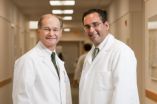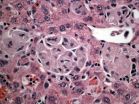(Press-News.org) In a world first, a completely robotic surgery and anesthesia has been performed at the McGill University Health Centre (MUHC). The DaVinci surgical robot, which lets surgeons work from remote locations, was put to work this summer, whereas the anesthesia robot, nicknamed McSleepy, has been providing automated anesthesia since 2008. The two combined to perform the first all-robotic surgery on a prostatectomy patient at the Montreal General Hospital.
"Collaboration between DaVinci, a surgical robot, and anesthetic robot McSleepy, seemed an obvious fit; robots in medicine can provide health care of higher safety and precision, thus ultimately improving outcomes," said Dr. TM Hemmerling of McGill University and MUHC's Department of Anesthesia, who is also a neuroscience researcher at the Research Institute (RI) of the MUHC.
"The DaVinci allows us to work from a workstation operating surgical instruments with delicate movements of our fingers with a precision that cannot be provided by humans alone," said Dr. A. Aprikian, MUHC urologist in chief and Director of the MUHC Cancer Care Mission, and also a researcher in the Cancer Axis at the RI MUHC. He and his team of surgeons operate the robotic arms from a dedicated workstation via video control with unsurpassed 3D HD image quality.
"Providing anesthesia for robotic prostatectomy can be challenging because of the specific patient positioning and the high degree of muscle relaxation necessary to maintain perfect conditions for the surgical team," added Dr. Hemmerling. "Automated anesthesia delivery via McSleepy guarantees the same high quality of care every time it is used, independent from the subjective level of expertise. It can be configured exactly to the specific needs of different surgeries, such as robotic surgery."
"Obviously, there is still some work needed to perfect the all robotic approach – from technical aspects to space requirements for the robots," added Dr. Hemmerling. "Whereas robots have been used in surgery for quite some time, anesthesia has finally caught up. Robots will not replace doctors but help them to perform to the highest standards."
Combining both robots, the specialists at the MUHC can deliver the most modern and accurate patient care. The researchers will use the results of this project to test all robotic surgery and anesthesia in a larger scale of patients and various types of surgery. "This should allow for faster, safer and more precise surgery for our patients" concluded Dr. Aprikian.
###
Photos are available on the web: http://muhc.ca/newsroom/news/mcsleepy-meets-davinci
About the McGill University Health Centre (MUHC)
One of the world's foremost academic health centres, the MUHC offers exceptional and integrated patient-centric care, research and teaching. Highly committed to the continuum of care in its community and affiliated with the Faculty of Medicine of McGill University, The Montreal Children's Hospital, the Montreal General Hospital, the Royal Victoria Hospital, the Montreal Neurological Hospital, the Montreal Chest Institute and the Lachine Hospital of the MUHC value multidisciplinary service throughout the lifespan, innovative technologies and practices, strategic partnerships and leadership in knowledge transfer. The MUHC is currently carrying out a $2.25-billion Redevelopment Project on three campuses—the Mountain, the Glen and Lachine—designed to provide healthcare professionals with an effective environment in which to ensure patients and their families benefit from The Best Care for Life. The campuses are also anchored in best sustainable-development practices, including LEED® and BOMA BESt guidelines.
The Research Institute of the McGill University Health Centre (RI MUHC) is a world-renowned biomedical and health-care hospital research centre. Research is organized by eleven research axes (or programs). Located in Montreal, Quebec, Canada, the Institute is the research arm of the McGill University Health Centre affiliated with the Faculty of Medicine at McGill University. The Institute supports over 600 researchers, 1,000 graduate students, post-docs and fellows devoted to a broad spectrum of fundamental and clinical research. Over 1000 clinical research studies are conducted within our hospitals each year. The Research Institute of the MUHC is supported in part by the Fonds de la recherche en santé du Québec (FRSQ).
www.muhc.ca/research/
About McGill University
McGill University, founded in Montreal, Que., in 1821, is Canada's leading post-secondary institution. It has two campuses, 11 faculties, 10 professional schools, 300 programs of study and more than 35,000 students. McGill attracts students from more than 150 countries around the world. Almost half of McGill students claim a first language other than English – including 6,200 francophones – with more than 6,800 international students making up almost 20 per cent of the student body.
www.mcgill.ca
END
Princeton engineers have developed a sensor that may revolutionize how drugs and medical devices are tested for contamination, and in the process also help ensure the survival of two species of threatened animals.
To be fair, some of the credit goes to an African frog.
In the wild, the African clawed frog produces antibacterial peptides -- small chains of amino acids -- on its skin to protect it from infection. Princeton researchers have found a way to attach these peptides, which can be synthesized in the laboratory, to a small electronic chip that emits an electrical ...
Outgoing. Assertive. Calm. Practical. Decisive. These are obvious qualities that one would want in their leaders.
But what about, say, arrogant, hesitant, overly dramatic, inflexible, or being a "yes-man"? A new study has found that when it comes to leading, some of those negative personality traits aren't such a bad thing, either.
The work, by researchers in the University of Nebraska-Lincoln's College of Business Administration, studied the development of leaders over a three-year period. Prior research had established that clearly positive personality qualities ...
WASHINGTON, D.C., October 19, 2010—In response to a study regarding fish oil use during pregnancy published in the October 19 issue of the Journal of the American Medical Association (JAMA), the Council for Responsible Nutrition (CRN), the leading trade association for the dietary supplement industry, reminds pregnant and lactating women of the undisputed importance of consuming the recommended amounts of docosahexaenoic acid (DHA) throughout pregnancy. This can be done by eating two servings of fatty fish, such as sardines or anchovies, per week, or taking fish oil supplements ...
The 2010 Nobel Prize in Physics went to the two scientists who first isolated graphene, one-atom-thick crystals of graphite. Now, a researcher with the University of Houston Cullen College of Engineering is trying to develop a method to mass-produce this revolutionary material.
Graphene has several properties that make it different from literally everything else on Earth: it is the first two-dimensional material ever developed; the world's thinnest and strongest material; the best conductor of heat ever found; a far better conductor of electricity than copper; it is virtually ...
Athens, Ga. – When we make decisions based on what we think someone else will do, in anything from chess to warfare, we must use reason to infer the other's next move—or next three or more moves—to know what we must do. This so-called recursive reasoning ability in humans has been thought to be somewhat limited.
But now, in just-published research led by a psychologist at the University of Georgia, it appears that people can engage in much higher levels of recursive reasoning than was previously thought.
"In fact, they do it fairly easily and automatically," said Adam ...
ANN ARBOR, Mich. – Millions worldwide die each year because they can't afford a pacemaker. Meanwhile heart patients in the United States say they'd be willing to donate theirs after death to someone in need.
In the current issue of Circulation, experts at the University of Michigan Cardiovascular Center examine the legality and logistics of collecting pacemakers, after they are removed for burial or cremation, for sterilization and reuse across the globe.
Small humanitarian efforts have shown reusing pacemakers is safe and effective with little risk of infection and ...
Researchers at Yale School of Medicine have found that new disease pathways involving more than one cell type leads to Type 1 Gaucher disease, a rare genetic disorder in which fatty substances called glycosphingolipids accumulate in cells, resulting in liver/spleen enlargement, osteoporosis, bone pain, and increased risk of cancer and Parkinson's disease.
The new findings could lead to less expensive and more effective ways to treat the disorder, which affects about 1 in 50,000 people in the general population. Those of Eastern and Central European (Ashkenazi) Jewish ...
A new report issued by the International Osteoporosis Foundation (IOF) for World Osteoporosis Day puts the spotlight on the severe impact of spinal fractures and calls on health professionals to recognize the signs of these fractures in their patients.
"The widespread under–diagnosis and lack of treatment of spinal fractures, leaves millions of people around the world with chronic pain, deformity, disability and at high risk of future fractures," says Professor John Kanis, President of the IOF.
As many as two-thirds of spinal osteoporotic fractures are not recognized ...
GOLDEN, Colo. (October 20, 2010) – A new independent study by HealthGrades of patient outcomes at America's hospitals found that patients at 5-star rated hospitals had a 72% lower risk of dying when compared with patients at 1-star-rated hospitals -- an enormous gap that has held steady over the past years even as overall mortality rates have improved. According to the study, if all hospitals performed at the level of 5-star rated hospitals over the three years studied, 232,442 Medicare lives could potentially have been saved.
Released today, the Thirteenth Annual HealthGrades ...
Nagoya, Japan, 20 October 2010– The economic importance of the world's natural assets is now firmly on the political radar as a result of an international assessment showcasing the enormous economic value of forests, freshwater, soils and coral reefs, as well as the social and economic costs of their loss, was the conclusion of The Economics of Ecosystems and Biodiversity (TEEB) report launched today by TEEB study leader, Pavan Sukhdev.
"TEEB has documented not only the multi-trillion dollar importance to the global economy of the natural world, but the kinds of policy-shifts ...



